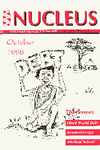Wow, I'd love to go to South Africa. I can go on safari and see lots of animals.' That was my immediate thought when I first saw the brochure for the 11th World Congress of the International Christian Medical and Dental Association (ICMDA) in Durban.
Log fires
On arrival at the student conference at the Africa Enterprise Centre near Pietermaritzburg (40km inland from Durban) it became, 'Wow, all these amazing people from all over the world'. After the first night with just a dozen of us chatting around the log fire, there were around 100 students; 40 were from South Africa, 30 from the rest of Africa and 30 from the rest of the world. The UK had the largest foreign group (it was strange thinking of ourselves as foreigners) with ten students. I realised, yet again, what a small world it is when I bumped into a girl called Daphne from Uganda and discovered that we'd actually met before on a ward round in a hospital in Kampala, Uganda, when I was doing my medical elective earlier in the year.
However, the conference was certainly about more than just meeting people. It wasn't long before I felt God metaphorically tapping me on the shoulder and pointing out that perhaps there was another reason for me being there. The spiritual tone of the week was set near the beginning by one of the speakers, Berit Kloster, who gave a prophetic word challenging us about our commitment to Christ. This inspired a song that was later performed at the graduate conference with the words 'I know that you will serve me, but do you really love me?'
World views
The theme of the student congress was 'World View'. We were challenged by speakers such as Craig Bartholomew and Herbert Beerens that as Christians, our world view should affect every area of our lives, including our medicine. A Canadian doctor, John Patrick, made us re-examine the way that we are taught in medical school. The whole of our education is based on an atheistic world view. With the presupposition that there is no higher power, we learn to consider ourselves, and our patients, as merely physical beings, faulty machines needing to be fixed. This approach leaves no room for a spiritual dimension to our lives.
Peter Saunders spoke on 'Managing Competing Time Demands' and, I'm sorry to have to report, contradicted Andrew Fergusson's statement at the last CMF national conference, that 'we have more time now than we ever will in the rest of our lives'. In fact, as Peter rightly pointed out, we have exactly the same amount of time as we always will do - 24 hours in each day. If we don't have enough time for everything, then we're doing something that God doesn't want us to do.
The orange tree god
Since many of the speakers had used their medicine to work abroad there was a strong emphasis on mission work throughout the week. One evening a group of us became the Olongo Tribe, an unreached people group, as part of a missions simulation. We developed our own culture and belief systems (including our own god who lived at the top of the orange tree) while various agencies came in to try and evangelise us. Many frustrations and difficulties were encountered. Through this we learnt the importance of working together when trying to reach such people as well as respecting the way of life that they already have.
Another world
People often talk about culture shock when visiting Africa but for us the biggest shock was moving to the main graduate conference at the extremely lavish International Convention Centre in Durban. We were now part of nearly 900 delegates from 50 different nations. Here we heard talks based on the theme of 'Health Care Beyond 2000 - Reconciliation and Integrity through Christ'.
One of the talks that most challenged me was by an American doctor, Dan Fountain, who talked again about 'Healing the Whole Person'. He talked about Jesus who saw each individual as a human being rather than just a disease needing to be cured. In the case of the woman with the haemorrhage (Mk 5), her condition made her unclean and an outcast from society. Her uterine bleeding even prevented her from approaching the temple to find God. The healing of her body took place when she touched Jesus but her 'psychospiritual pathology' (her broken heart and wounded spirit) were healed by his words. In our lives as doctors we're going to come across much need that we ourselves won't always be able to meet, so we should be more ready to refer people on to a pastoral team of fellow believers. This will enable their spiritual needs to be met as well as their physical ones.
In the evening we had presentations from many of the countries represented as well as music from the incredible Zulu choirs, complete with traditional dancing.
Being Christian doctors
In the few days after the conference before I had to fly home I did manage to see my animals. I've made new friends all over the world (who hopefully I'll meet up with at the next ICMDA conference in Taiwan, 2002). I've come away with Peter Saunders' list of 'books all Christians should read' and am devouring CS Lewis. But most of all, I've been challenged to aim to become not just a doctor who happens to be Christian, but a Christian doctor. As the apostle Paul says: 'we are God's workmanship, created in Christ Jesus to do good works, which God prepared in advance for us to do' (Eph 2:10). If God is calling us to be doctors then medicine is a big part of the task he has for us.
































